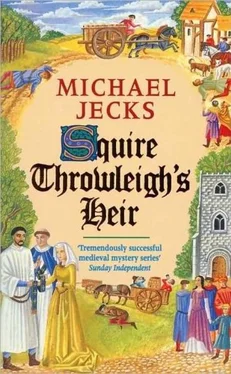‘She’s a woman, in Christ’s name!’
‘Forget chivalry for a moment, Simon, forget courtesy. Lady Katharine is an intelligent woman, one with a long life ahead of her – she can only be some five-and-twenty years old. Any man marrying her would always know that the main part of her dowry would be his only until her son grew to be of age – and any son of his own would be without an inheritance. Tell me, if you were in her shoes, wouldn’t you wonder how much better your future prospects would be, without the burden of a readymade son?’
Simon stared aghast. ‘You’re asking me to believe that she adored her husband, but in the same breath you propose that she killed the only fruit of that union: I say that is unlikely. You suggest that she could not only plan to destroy her own son, but that she could participate in his end: I consider that improbable in the extreme. You then say she might be considering her future with another man, that she is already considering her next husband, yet that would presuppose that a suitable husband would wait for a year so that she could avoid any accusation of infamy for marrying before the end of her period of mourning. That is far too speculative.’
‘Perhaps, but it is possible. Look at the way that the Fleming is trying to insinuate himself into her favour.’
‘You think he is?’ Simon asked doubtfully, then smiled with delight as he hit the slug. It fell from the stone leaving a yellow stain. ‘Even if he were, surely it’s unlikely that she’d countenance his advances. You can’t doubt her feelings about her husband, can you?’
‘No-o,’ Baldwin agreed. ‘No, her misery was all too plain after Roger’s death. And yet van Relenghes appears to think he can win her over.’
‘I reckon it’s more likely that a band of marauding outlaws came past here, murdered the child, went up to the moors and were swallowed up by a mire, than that she could have been involved.’
Baldwin gave a grin at his friend’s exasperated tone. ‘Very well, then, Simon. So we have more to discover about the whole affair.’ He looked up to see Nicholas cantering past on a pony, heading for the Throwleigh road. ‘It seems Thomas has sent to check on Edmund’s hose. Perhaps we should begin by questioning the man whom everyone assumes is guilty.’
When they arrived at the locked door of the small cell beneath the chapel, they found a sulky Wat waiting with Daniel and Thomas. The boy carried a tray of food, Baldwin was relieved to see: at least the farmer wasn’t going to be starved while he awaited his appearance in the manor’s court. The new lord of the manor said nothing, but gave a sharp gesture, and the steward shoved a massive key into the lock. It made a grinding noise as it turned, but then opened, and the men all entered. Baldwin was last, and when Simon turned, he saw the knight speak quietly to Wat before slipping inside.
The knight found himself in a simple cell some twelve feet square. It was not so terrible as some he had seen – his own little gaol in Crediton was worse, a mere hole in the ground – but this was dark and gloomy. The only light came through a grating high in the wall. To Baldwin the sunlight looked as if it had expended all its energy in breaking in, and having achieved that it was so enfeebled it had no ability to warm.
Edmund was seated on a bench in the corner. A toilet bucket had been provided, and from the stench he had already used it. Baldwin winced. Ever since his time in the Knights Templar, when he had spent many months in the Kingdom of Cyprus, he had appreciated cleanliness and fresh odours. Edmund was quite obviously terrified; he equated his arrest with his death – and not, as Baldwin thought privately, without good reason. It was evident that Thomas viewed him as the perfect scapegoat.
Baldwin took his seat on an old barrel and studied the farmer. Edmund had lost his previous swagger. Now he sat as one crushed by events too monstrous to defy. Every so often he gave a brief shiver, as if the cold had eaten into his bones, and he refused to look at his visitors.
Thomas swung a riding switch, which caught the farmer on his shoulder. He flinched and drew back as the new squire cried, ‘Tell us what happened, fool, or you’ll get worse than that!’
Simon said curtly, ‘We want to know what happened on the day that Master Herbert died, Edmund. Don’t worry that you’ll get punished if you are innocent. I’ll ensure you’re safe.’
‘Sir, I’ve done nothing – it wasn’t my fault,’ Edmund said, and for that moment his voice was strong and clear, but immediately his tone dropped and he began to snivel. ‘He was dead when I got there. I didn’t do anything that could have hurt him, he was beyond that already.’
‘Tell us what happened.’
Edmund sniffed, his attention apparently fixed on his worn-out boots. ‘I told you I’d been up to Oakhampton, and after I’d sold what I could, I’d gone to the tavern. God only knows, there wasn’t much money, not from the few eggs and chickens I could sell, but I needed something to refresh me. The last few months have been so hard, sir, and what with being told that we were to be evicted, and then that I’m to be servile again… well, I needed a drink.
‘I was there a while, long enough to swallow two quarts of strong ale, before setting off for home. I came down past the Sticklepath, and out onto the moor road, then cut through the woods to the lane where I could turn off to Throwleigh. That was when I saw Master Thomas on the road, and chose to walk this way instead.’
Simon glanced up at Thomas. The Master of Throwleigh gripped his switch tightly and took a short step forward. ‘You dare to try to implicate me? By God’s blood, I’ll see you flayed for this!’
Baldwin took hold of his arm, remonstrating gently. ‘There’s little point in asking questions if you’re going to thrash him when he gives you an answer. All right, Edmund – why did you decide to pass by the manor?’
Edmund looked exhausted. ‘I told you the truth before, Sir Baldwin. I found a small cony, and wasn’t going to leave it to the rooks, so I picked it up, but when I came to the fork, I saw Master Thomas on the road to Throwleigh, and thought I’d better not go past him; he might realise I had something with me.’
Thomas gave him a filthy look and spat at his foot. ‘Liar!’
Simon and Baldwin ignored him. There was a silence for some moments, and then Thomas threw out his hand passionately. ‘Look at him! I ask you! What would I have been doing down there, eh?’ Emboldened by his own rhetoric, Thomas spun round to face Edmund. ‘Well? What was I doing, then?’
Edmund sighed, and glanced hopelessly up at the grille in the window far above, paying no heed to Thomas, who hurled his crop away from him and began pacing up and down.
It was not the first time Baldwin had seen such a look on a man’s face: it showed complete despair, the realisation that whatever Edmund might attempt, he was already doomed. That look of complete submission to fate was commonplace on the faces of men and women whom Baldwin had been forced to accuse in the past, especially when a Coroner was present and the court could demand the highest penalty; that of death. It invariably meant that the prisoner knew that the forces of authority had already decreed his end. Baldwin knew that he must remove Thomas if they were to discover more.
‘You want food?’ he asked, and when Edmund gave a surly shrug, he called Wat inside. Wat passed the tray to the prisoner, and then glanced at the knight.
Simon could have sworn that as Wat met his master’s eye, Baldwin gave a fleeting wink. Wat nodded, and hurried from the room while Baldwin leaned both elbows on his knees and surveyed the farmer.
Читать дальше












